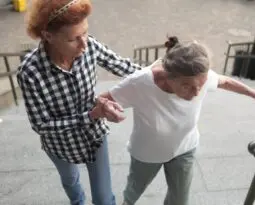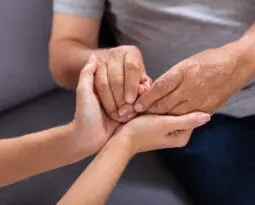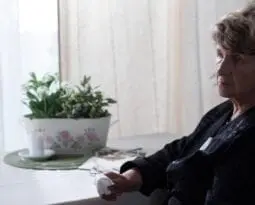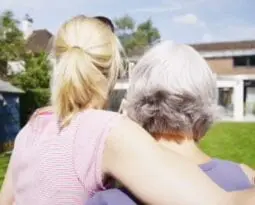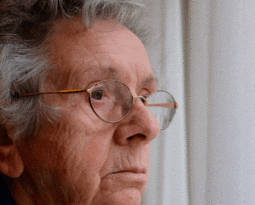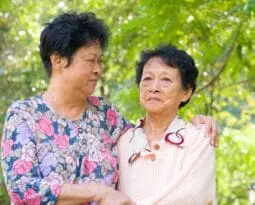Ethics and the Family Caregiving
Selected resources from The Hastings Center.
Bioethics Briefings:
Family Caregiving
The central philosophical question in family caregiving is how to best support infrastructures of care in times where changes in demographics, workforce patterns, and health care economics have increased the need for—and complexity of—caregiving. Most long-term care to older adults is provided at home by family caregivers. Read our briefing to consider: How can policy makers, bioethicists, and health care workers work to improve the quality of caregiving and the well-being of caregivers?
From Hastings Bioethics Forum:
- Doing Right by Family Caregivers During Discharge PlanningAs family caregivers who are everywhere yet overlooked in aging societies worldwide, we ponder and discuss this question as bioethicists: “Who cast me in this role?”
- Meeting the Needs of Aging Patients with Chronic Mental and Medical IllnessesMy brother-in-law Mark died a couple of weeks ago. He had struggled with schizophrenia for over 45 years, so at age 64 1/2, he had exceeded…
- After the Election, Our Aging Society Will Still Need Care PolicyAfter the election, the care needs of our aging society will continue to be met by families showing up, day after day. Whether or not our public officials decide to imagine otherwise and commit themselves to policy changes that could prove highly popular, bioethics needs to keep its eyes on the caregivers.
- Aphasia, Communication, and CaregivingWhat “recovery” really means in aphasia is left unsaid in this novel.
- I Was Never “Just” a VisitorCaregivers are not visitors. Hospital policies that restrict visits from family caregivers can harm patients.
- Humanity on the Brink: Narratives of Caregiving and DementiaNewly published first-person stories of the challenges, struggles, and joys of providing care for family members or another close person with Alzheimer’s disease and other types of dementia “depict humanity on the brink.”
- On Being a Foster Parent During CovidI knew that being a foster parent would be demanding, but I was unprepared for the extent of the challenges, which were exacerbated by the pandemic.
- Old JewsOld Jews are why I am who I am. Not only the old Jews you’d expect–my grandparents and great-grandparents, who came here because, as I learned…
- Ethical Perspectives on Advance Directives for DementiaFour articles in the Hastings Center Report make an array of claims about whether advance directives should or should not be used to instruct caregivers to…
- Envisioning Civic Palliative CareDying cannot be understood properly, or responded to well, without recourse to the connections between the dying experience and the larger social structures that make up…
- Love and Boundaries in MedicineIt’s a little-known and rarely discussed fact of medical practice that doctors value the ability to love our patients. If the thought of doctors loving patients…
- Should We Get Ready for Prime Time?For the first few years after my husband Howard died, I talked to him often. These were not ghostly, paranormal encounters; I was just thinking out…
- The Lady Writer and the Valkyrie: Magda Szabo’s Novel The DoorAn old woman desperately needs medical attention. Yet she fiercely refuses every offer of help from friends, neighbors, and the local doctor. No one will get…
- Sweet Grapes at the End of LifeMs. Rita, whom I met as a volunteer at a local nursing home, was the most ardent lover of grapes I have ever known. She was…
- Lincoln’s Promise: Congress, Veterans, and Traumatic Brain InjuryPerhaps we were naïve. Our plan was relatively simple: we would chart the legislative evolution of programs for veterans with traumatic brain injuries (TBI) to identify…
- Singapore Case Notes: In the Community, Who is Ethics Education For?For previous posts on the Singapore Casebook project, a collaboration among the Centre for Biomedical Ethics at the National University of Singapore, The Hastings Center, and…
- Administration Reveals Lack of CLASSThe demise of the CLASS (Community Living Assistance Services and Support) Act is the calamitous result of ideological warfare and political cowardice. It would have provided…
From Hastings Center Report:
Centering Home Care in Bioethics Scholarship, Education, and Practice
First published: 07 June 2023
Abstract
This commentary responds to “Home Care in America: The Urgent Challenge of Putting Ethical Care into Practice,” by Coleman Solis and colleagues, in the May-June 2023 issue of the Hastings Center Report. More specifically, we respond to the authors’ call for “inquiry into the nature, value, and practice” of home care. We argue that the most urgently needed normative reset for thinking about care work is the replacement of dominant individualistic thinking with systemic thinking. Deepening a focus on the social, economic, and historical forces that shape the state of contemporary care work will help bioethicists to argue more effectively for improvements to working conditions. In turn, better working conditions will ease the oppositional stance between caregivers and receivers that has been set up by the current system, enabling all parties involved to better pursue the feminist ethical ideal of care.
Burdening Others
First published: 13 October 2022
Abstract
Many people are afraid they will, as they age or fall ill, become burdens to others. Some who fear this say they would be willing to hasten their own deaths—engaging in self-sacrifice through suicide, assisted suicide, or euthanasia—to avoid it. Still, some bioethicists and other critics of medical aid in dying reject the idea that fear of being a burden can be a good reason for self-sacrifice. They argue that dependency is nearly universal, emphasize that caregiving is a valuable pursuit, and raise concerns about the impact of aid-in-dying policies on vulnerable groups. After defining what it is to be a burden, articulating why being a burden is morally significant, and, crucially, distinguishing burdensomeness from what I call “mere dependency,” I defend the intuition that self-sacrifice can be justified by the desire to avoid being a burden and by the concern for the well-being of one’s caregivers that this choice implies.
Deciding with Others: Interdependent Decision-Making
First published: 20 December 2022
Abstract
Over the course of human life, health care decision-making is often interdependent. In this article, we use “interdependence” to refer to patients’ engagement of nonclinicians—for example, family members or trusted friends—to reach health care decisions. Interdependence, we suggest, is common for patients in all stages of life, from early childhood to late adulthood. This view contrasts with the common bioethical assumption that medical decisions are either wholly independent or dependent and that independence or dependence is tightly coupled with a person’s decision-making capacity. In this article, we array various approaches to decision-making along a continuum of interdependence. An appreciation of this continuum can empower patients and elucidate ethical challenges that arise when people transition between different kinds of interdependence across the life span.
Considering People with Dementia and Their Caregivers in Covid-19 Lockdowns
First published: 14 December 2021
Abstract
Recent outbreaks in Australia and the detection of more virulent SARS-CoV-2 strains suggest that Covid-19 is not yet over. In July 2021, three states in Australia were in lockdown as a result of community transmission of the Delta variant. Despite being effective at mitigating outbreaks, lockdowns could have adverse effects on the elderly and people with dementia. This commentary reviews general lockdown and aged-care lockdown policies in Victoria, New South Wales, and South Australia and highlights how these could affect the well-being of people with dementia and their caregivers. Drawing from literature on Covid-19 and dementia, this commentary provides pragmatic recommendations on how to consider the well-being of people with dementia and their care providers in Covid-19 management policies.
Care Ethics versus the CARES Act
First published: 13 July 2021
Abstract
One of the biggest policy interventions during the last year of the COVID-19 pandemic was the Coronavirus Aid, Relief, and Economic Securities Act, instituting a novel form of economic relief similar to a universal basic income. The economic impact payments, colloquially known as “stimulus checks,” were distributed based on the socioeconomic status of American citizens and legal residents and provided much-needed financial aid. However, the distribution of these payments paid little attention to other important factors that might determine the economic security of said individuals, such as race and gender. This article calls for policy-makers to pay particular attention to how structural inequity and discrimination based on identity could affect the efficacy of proposed policies and demonstrate an ethic of care informed by an understanding of intersectionality.
Improving Long-Term Care by Finally Respecting Home-Care Aides
First published: 11 October 2018
Abstract
The American system of long-term care is disorganized and expensive. Obtaining care for a loved one is a confusing and difficult journey. When it comes to paying for that care, a bit over half who receive care are supported at least partially by insurance, and those with no insurance pay entirely out of pocket. The costs are exorbitant. What makes the system function is reliance on unpaid family members, who care for their loved ones often at considerable cost to themselves.
As the baby boom generation ages, this creaky system will become increasingly dysfunctional, and a likely shortage of caregivers will be at the heart of the difficulties. The supply of unpaid family caregivers will become limited, as the ratio of people in the category of ages forty-five to sixty-four compared to those who are eighty and older shrinks from just above seven to one in 2010 to just above four to one in 2030. Paid caregivers will be needed to take up the slack, yet they are poorly paid, work under very difficult conditions, and receive little respect from the health care system. In this essay, I discuss the circumstances facing these paid home-care workers and a possible path forward, illustrating the current problems by drawing on interviews I conducted for a book-length study published in 2017.
What Can Thinking Like a Gerontologist Bring to Bioethics?
First published: 11 October 2018
Abstract
I am a social gerontologist, broadly defined as a social scientist who studies how later life is experienced, structured, and controlled in a society and in social settings. Although gerontology is often confused with geriatrics (a medical specialty), gerontologists are typically not clinicians but may study issues related to old age and health care such as the societal conditions that shape how medical care is provided and financed and how early exposure to education relates to later life health.
In this essay, I argue that thinking like a gerontologist is important when considering what makes a good life in late life. To think like a gerontologist is to consider the cultural and societal values—past and present—that shape the experience of aging, to recognize people as complex beings whose individual lives do not follow predictable patterns or easily identified trajectories, and to recognize our own habits of regarding older persons as “other” and the consequences of “othering” for older persons and social systems. After a brief history of gerontology, highlighting a few core concepts that gerontologists share, I propose three important questions to consider regarding a good life in late life.
Precarious Aging: Insecurity and Risk in Late Life
First published: 11 October 2018
Abstract
Population aging and longevity in the context of declining social commitments raise concerns about disadvantage, inequality, and the well-being of older people. In this short piece, we use the concept of precarity as a lens to understand new and sustained forms of insecurity that affect late life, and we illustrate how these risks, when experienced over time and in relation to conditions such as austerity, can deepen disadvantage.
Cueing “The Conversation”
First published: 10 July 2013
Abstract
In “Avoiding a ‘Death Panel Redux,” Nicole M. Piemonte describes how she tried to fire palliative care after first refusing to let it—and any mention of death, from any source—into her dying mother’s room. One way to read this is as a familiar human story about the profound difficulty of facing death, a story that, too often, is reduced to the word “denial.” But Piemonte and Hermer suggest that there is another way to read this story, in terms of the structure that was absent from the earliest conversations and relationship-building among this patient, her daughter, and the doctors. If advance care planning had been part of the structure all along, if everyone—oncologists, patients, loved ones—talked about prognosis, preferences, benefits, burdens, and goals from the time a life-threatening disease was diagnosed, as a normal part of good care, would Piemonte have understood her own role as caregiver and advocate differently? If, early on, her fifty-year-old mother had been asked, “what do you want to do with the rest of your life?” and had been assured that this question mattered and encouraged to talk about her hopes (such as attending her daughter’s wedding), might her treatment and care have been organized in a different way?
From Hastings Center Bioethics Timeline:
1987: Publication of The Hastings Center’s Guidelines on the Termination of Life-Sustaining Treatment and the Care of the Dying
This publication was the first comprehensive consensus-based ethics guidance on end-of-life care. It provided guidelines for health care professionals on the decisions faced by dying patients, their families, and other caregivers. In the introduction to the second edition, the authors reflected on the first edition: “This groundbreaking book, whose principal author was Susan M. Wolf, was widely consulted and influential in the U.S. and internationally. It was cited by Justice O’Connor in the U.S. Supreme Court’s Cruzan decision and helped shape the current ethical and legal framework for medical decision-making and end-of-life care.”
Berlinger, N., Jennings, B., and Wolf, S. M., 2nd ed., The Hastings Center Guidelines for Decisions on Life-Sustaining Treatment and Care Near the End of Life (Oxford University Press, 2013). https://ssrn.com/abstract=2324200.
1992: Joint Commission Establishes Requirement of a Mechanism to Address Ethical Issues in Health Care
The Joint Commission on Accreditation of Healthcare Organizations (JCAHO) first required a “mechanism(s) for the consideration of ethical issues in the care of patients and to provide education to caregivers and patients on ethical issues in health care” in its Accreditation Manual. Though the standard does not require ethics committees per se, and ethics committees were noted (though the description was at best incomplete) in the Karen Ann Quinlan case as a potential aid in the resolution of difficult ethical cases, this standard fostered the proliferation of ethics committees in hospitals. At the time of Quinlan, ethics committees were rare; today they are nearly ubiquitous.
Joint Commission on Accreditation of Healthcare Organizations, Accreditation Guide for Hospitals, Oak Park, IL: JCAHO, 1992. https://www.jointcommission.org/-/media/deprecated-unorganized/imported-assets/tjc/system-folders/topics-library/171110_accreditation_guide_hospitals_final.pdf?db=web&hash=A4AA2E4B34B5E47F6DD59FFE7CDBA20F.
2010: Founding of the Patient-Centered Outcomes Research Institute (PCORI)
The U.S. Congress authorizes the creation of PCORI, an independent nonprofit nongovernmental organization to improve the quality and relevance of evidence to help patients, caregivers, and clinicians to make better-informed health care decisions. The creation of PCORI reflects a shift towards empowering patients by giving them a more active role in making decisions about their care and managing their own health.
2016: Medicare Reimbursement for Conversations about End-of-Life Care
Medicare begins to reimburse physicians for conversations about preferences for end-of-life care. Long an issue of bipartisan agreement, the idea of reimbursing for discussions about end-of-life preferences had become a political lightening rod and was removed from the 2010 Affordable Care Act after it was mischaracterized as a “death panel” during the presidential election campaign and subsequent debates over the Act.
https://khn.org/news/doctors-ponder-delicate-talks-as-medicare-pays-for-end-of-life-counsel/
